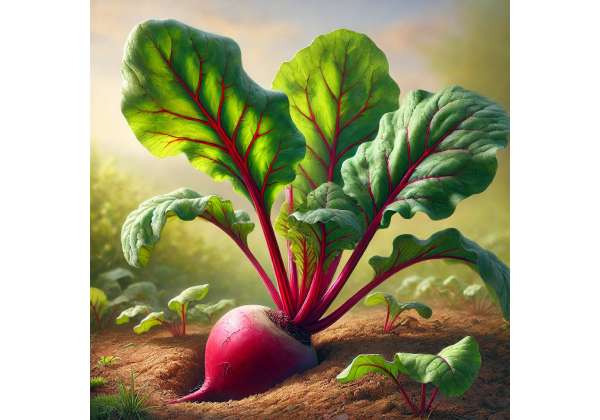
Beetroot is more than a colorful root vegetable. It is one of the most practical “food as support” options for circulation, exercise tolerance, and everyday nutrient density. Its deep red pigments signal a rich supply of plant compounds, while its naturally occurring nitrates can raise nitric oxide levels, helping blood vessels relax and blood flow move more efficiently. Many people use beetroot for steadier energy during workouts, modest blood pressure support, and better meal-to-meal digestion thanks to its fiber. It is also versatile: you can roast it, blend it, pickle it, or use standardized juice shots and powders when you want a more predictable dose. Like any concentrated functional food, beetroot has a few important cautions, especially for people prone to kidney stones or those already on blood pressure-lowering medicines. Used thoughtfully, it can be both nourishing and surprisingly targeted.
Essential Insights
- Daily beetroot intake can modestly lower systolic blood pressure in some people, especially those with hypertension.
- A pre-exercise beetroot juice dose can improve endurance and “feel” of effort for certain workouts.
- Concentrated products may trigger low blood pressure symptoms or stomach upset in sensitive users.
- Typical supplemental range: 200–800 mg nitrate per day, or about 70 mL concentrated beetroot shot taken 2–3 hours before exercise.
- Avoid concentrated beetroot if you have recurrent calcium oxalate kidney stones, advanced kidney disease, or frequent dizziness from low blood pressure.
Table of Contents
- What is beetroot and what is in it
- Does beetroot lower blood pressure
- Beetroot for exercise and stamina
- Beetroot for brain and metabolism
- How to use beetroot daily
- How much beetroot per day
- Is beetroot safe for everyone
What is beetroot and what is in it
Beetroot (Beta vulgaris) is the swollen taproot of the beet plant, valued both as a food and as a concentrated ingredient in juices and powders. What makes it “functional” is not one magic compound, but a stack of nutrients and plant chemicals that work through different pathways.
Key active components
- Inorganic nitrates (NO3−): These are the headline compounds for circulation. Your body can convert dietary nitrate into nitric oxide, a signaling molecule that helps blood vessels relax and supports efficient blood flow.
- Betalains (betacyanins and betaxanthins): These pigments give red and golden beets their color. They act as antioxidants and may help calm inflammatory signaling, especially under stress (hard exercise, poor sleep, heavy meals).
- Betaine (trimethylglycine): A methyl donor involved in homocysteine metabolism and liver fat handling. It is one reason beets are often discussed in “liver support” conversations, although effects depend on overall diet and dose.
- Polyphenols and other antioxidants: Including phenolic acids and flavonoids that may support vascular and metabolic health in smaller, supporting roles.
Nutrients that matter in real life
Beetroot contributes fiber (helpful for regularity and gut microbes), plus folate, potassium, magnesium, manganese, and modest vitamin C and iron. The root is not especially high in protein or fat, which is why beetroot “works” best as a supportive addition rather than a standalone solution.
Why beetroot effects vary
Two people can drink the same beet juice and feel different results. Nitrate content varies by beet variety, growing conditions, and processing. More importantly, nitrate needs help from oral bacteria: microbes in your mouth convert nitrate to nitrite, which then becomes nitric oxide in the body. If you frequently use strong antibacterial mouthwash, you may blunt the nitrate pathway and notice less benefit.
A practical mindset helps: think of beetroot as a “dial,” not a switch. It can shift blood flow and exercise efficiency in a favorable direction, but it will not override dehydration, poor sleep, low fitness, or an overall high-sodium diet.
Does beetroot lower blood pressure
Beetroot is best known for supporting blood pressure, mainly through nitrate-driven nitric oxide production. Nitric oxide helps blood vessels widen and respond more smoothly to changes in demand (standing up, walking, exercise, stress). For many people, the most noticeable effect is on systolic blood pressure (the top number), while diastolic changes are often smaller.
What results tend to look like
In hypertensive adults, daily nitrate intake from beetroot juice is commonly studied in the range of about 200–800 mg nitrate per day. In this zone, trials often show a modest reduction in systolic blood pressure. “Modest” matters clinically: a small average drop can still be meaningful at a population level, and some individuals respond more strongly than others.
Who tends to respond best
Beetroot support is usually more noticeable when:
- Baseline blood pressure is already elevated.
- Dietary quality is improving at the same time (more vegetables, less ultra-processed food, steadier potassium intake).
- Sodium intake is not excessive, and hydration is adequate.
- The person is not already taking multiple blood pressure-lowering agents that push pressure very low.
How fast it can work
Nitrate absorption is relatively efficient, and blood nitrate and nitrite typically rise within hours. Many people who feel an “effect” report it the same day: warmer hands, a slightly easier walk, or lower home readings. The more useful question is not “does it work once,” but “does it fit as a daily habit.”
How to use it alongside lifestyle changes
Beetroot is not a substitute for blood pressure medication when medication is needed. It can be a sensible adjunct to:
- A potassium-rich eating pattern (vegetables, beans, dairy if tolerated).
- Weight reduction if appropriate.
- Walking or zone-2 style cardio most days.
- Better sleep regularity.
If you already monitor at home, treat beetroot like any intervention: measure at the same time daily, note symptoms, and watch for lightheadedness. The goal is improved numbers with steady energy, not a “lowest possible” reading.
Beetroot for exercise and stamina
Athletes and casual exercisers often use beetroot because nitrate can improve the efficiency of oxygen use and blood flow during effort. The most consistent benefits show up in endurance-style work, repeated intervals, and sessions where “legs feel heavy” is the limiting factor. It is less reliable for pure strength and short, all-out sprint power, although some people still notice better training quality.
What it can realistically improve
Beetroot tends to help in ways that feel subtle but useful:
- Slightly lower perceived effort at a given pace
- Better ability to hold a steady pace near threshold
- Improved tolerance of repeated hard efforts with short recovery
- A small bump in time-to-exhaustion for steady aerobic work
The gains are usually not dramatic. Think “a few percent,” not “a new body.” That said, a few percent matters in sport and can make workouts more enjoyable for beginners.
Timing that matches biology
A common strategy is acute dosing 2–3 hours before exercise, which aligns with when nitrate-derived metabolites peak. Another approach is multi-day loading (for example, 3–7 days), sometimes paired with an acute dose on the day of a key workout. If you are experimenting, test beetroot on training days before you use it for an event, because digestive tolerance varies.
Dose targets people actually use
Performance-focused protocols often aim for roughly 8–16 mmol nitrate per day, which is about 515–1017 mg nitrate. Many commercial “shots” are designed around these ranges, but labels vary and nitrate content is not always listed. When nitrate content is unknown, consistency matters more than perfection: use the same product, same timing, and compare similar workouts.
Common reasons it feels like it “does nothing”
- Using strong antibacterial mouthwash near dosing (it can reduce nitrate conversion).
- Taking it too close to exercise (for many people, 30 minutes is too soon).
- Expecting a stimulant effect (beetroot is not caffeine).
- Trying it during dehydration or after very poor sleep.
Beetroot can be a useful tool, but it shines brightest when basics are already in place: hydration, carbs when needed, and a training plan that matches your current fitness.
Beetroot for brain and metabolism
Beyond blood pressure and workouts, beetroot is often discussed for brain function, glucose control, liver support, and recovery from oxidative stress. These areas are promising, but the effects are usually smaller and more dependent on context than the nitrate-blood pressure story.
Brain and cognitive support
Better blood flow can support mental clarity, especially in older adults or anyone with vascular risk factors. Beetroot may help by improving endothelial function and circulation, which can indirectly support attention and executive function during demanding tasks. In day-to-day life, the most realistic “brain benefit” is not a dramatic memory change, but improved resilience: fewer dips in focus when you are tired, stressed, or sedentary.
Metabolic and glucose considerations
Beetroot contains natural sugars, especially in juice form. That does not make it “bad,” but it changes who benefits most. For active people, beetroot juice can be a convenient carbohydrate source with added nitrate. For people with insulin resistance or diabetes, juice may spike glucose more than whole beetroot does. Whole roasted beetroot, beetroot in salads, or small amounts blended with protein and fat are often easier on glucose.
Liver and homocysteine pathways
Betaine supports methylation processes involved in homocysteine regulation and liver fat handling. This is one reason beetroot appears in “liver support” lists. Still, liver outcomes depend heavily on overall calorie balance, alcohol intake, and fiber quality. Beetroot can support a liver-friendly diet, but it will not cancel heavy drinking or a consistently high-calorie pattern.
Inflammation, recovery, and antioxidant support
Betalains and polyphenols can help manage oxidative stress after hard training or heavy meals. In practical terms, people may notice:
- Slightly reduced muscle soreness
- Better subjective recovery
- Improved “bounce back” after travel or late nights
Treat these as secondary benefits. If your main goal is gut health and inflammation control, beetroot works best as one part of a broader plant-forward pattern that includes legumes, berries, olive oil, and adequate protein.
How to use beetroot daily
Beetroot is unusually flexible: you can use it like a normal vegetable, or you can use standardized products when you want a more predictable effect. The “best” form depends on your goal, your digestion, and whether you care about convenience.
Food-first options
- Roasted beetroot: Roasting concentrates flavor and keeps texture pleasant. Roast, cool, and store for quick salads and bowls.
- Grated raw beetroot: Adds crunch and color to slaws, but can be harder on sensitive digestion.
- Steamed or boiled beetroot: Softer and gentler; if you boil, some soluble compounds can leach into water.
- Pickled beetroot: Convenient and tasty, but often higher in sodium and sometimes added sugar.
Juice, shots, powders, and capsules
- Beetroot juice (standard): Often used for daily cardiovascular support. Easier to take than cooking beets, but includes more sugar per serving than the whole root.
- Concentrated shots (often 60–80 mL): Common for exercise timing because the volume is small and dosing is designed to be consistent.
- Powder: Useful for smoothies, yogurt, or oatmeal. It can be easier to tolerate than large juice volumes for some people.
- Capsules/extracts: Convenient, but quality varies. If nitrate content is not listed, effects may be less predictable.
How to make it easier to tolerate
Digestive discomfort is the most common complaint with concentrated beetroot. Helpful tactics:
- Start with half a serving for 3–4 days.
- Take it with a small snack (banana, yogurt, toast) rather than on an empty stomach.
- If juice is too intense, blend with citrus, ginger, or berries.
- For IBS-prone users, prefer smaller doses and avoid combining with other high-fermentable foods at the same time.
How to preserve the nitrate pathway
If your main goal is nitric oxide support:
- Avoid strong antibacterial mouthwash close to dosing.
- Swish juice briefly before swallowing, or chew beetroot thoroughly.
- Keep dosing consistent for 1–2 weeks before judging results.
Daily use should feel sustainable. If beetroot becomes a “project,” it will not last long enough to matter. Build it into meals you already eat.
How much beetroot per day
Beetroot dosing is easiest when you decide on a goal first: general nutrition, blood pressure support, or exercise performance. Because nitrate content varies widely in whole foods, people who want precision often choose labeled juice shots or powders.
Whole beetroot as food
For general health and fiber:
- About 80–170 g per day (roughly 1/2 to 1 cup cooked beetroot) is a common, food-level amount.
- Use it 3–7 days per week based on preference and tolerance.
This approach is the most “diet-like” and typically the gentlest, but nitrate intake will be less predictable.
Beetroot for blood pressure support
A practical target from clinical studies is often:
- 200–800 mg nitrate per day, taken consistently.
Depending on the product, this might look like:
- 250–500 mL beetroot juice, or
- one concentrated shot (often around 70 mL) if it is formulated for nitrate delivery, or
- 3–10 g beetroot powder, depending on concentration.
If you are tracking home blood pressure, trial beetroot daily for 2–4 weeks, then reassess. If readings drop too far or you feel lightheaded, reduce the dose or frequency.
Beetroot for exercise performance
Common performance dosing patterns:
- Acute: Take a nitrate-focused serving 2–3 hours before training or competition.
- Chronic: Use a daily dose for 3–7 days, and optionally add an acute dose on the key day.
Many protocols aim for roughly 515–1017 mg nitrate per day (about 8–16 mmol), though not everyone needs the high end. Start moderate and only increase if you tolerate it well.
Timing, cycling, and “how long”
- For workouts, timing matters more than weeks of use.
- For blood pressure, consistency matters more than timing.
- Cycling is optional. Some people use beetroot on training days only; others use it daily for vascular support.
If you are unsure, choose the simplest plan: a moderate daily dose for 14 days, then keep it only if you see measurable benefit and feel good.
Is beetroot safe for everyone
Beetroot is a food and is generally safe in normal dietary amounts. Most safety issues arise with concentrated juices, shots, and powders, especially when combined with medications or pre-existing kidney concerns.
Common side effects
- Beeturia: Pink or red urine or stool is common and harmless.
- Digestive upset: Bloating, nausea, or loose stools can occur, especially with large juice volumes.
- Headache or dizziness: Sometimes a sign of blood pressure dropping too low for you.
Who should be cautious or avoid concentrated beetroot
Be extra careful if you have:
- Recurrent kidney stones, especially calcium oxalate stones (beetroot can be high in oxalates).
- Advanced kidney disease or a history of high potassium (beetroot provides potassium and concentrated products can add up).
- Frequent low blood pressure or episodes of fainting.
- Migraine sensitivity to blood flow changes (some people do fine, others do not).
Medication and supplement interactions
Talk with a clinician before using concentrated beetroot if you take:
- Nitrate medications for chest pain (for example, nitroglycerin products), because blood pressure effects could add up.
- Blood pressure medications, especially if your readings are already well controlled.
- PDE-5 inhibitors (commonly used for erectile dysfunction), since combined vasodilation can increase lightheadedness in some users.
If you use anticoagulants such as warfarin, the beetroot root is not a major vitamin K source, but beet greens can be. Consistency in your overall vitamin K intake matters more than avoiding a specific vegetable.
Pregnancy, breastfeeding, and children
Food-level beetroot is generally reasonable. Concentrated supplements are less studied in pregnancy and breastfeeding, so it is prudent to avoid high-dose protocols unless a clinician recommends them.
What the evidence really supports
The strongest, most repeatable evidence is for systolic blood pressure support and some performance outcomes, with response varying by baseline health and training status. Evidence for glucose control, cognition, and liver outcomes is promising but less consistent. A sensible rule: if you cannot measure the outcome you care about (blood pressure, workout performance, symptoms), keep the dose modest and treat beetroot as a nutritious food rather than a “treatment.”
References
- Effects of beetroot juice on blood pressure in hypertension according to European Society of Hypertension Guidelines: A systematic review and meta-analysis – PubMed 2024 (Systematic Review)
- Effects of Beetroot Juice on Physical Performance in Professional Athletes and Healthy Individuals: An Umbrella Review – PMC 2025 (Umbrella Review)
- Increased nitrate intake from beetroot juice over 4 weeks affects nitrate metabolism, but not vascular function or blood pressure in older adults with hypertension – PMC 2024 (RCT)
- Betalains: A Narrative Review on Pharmacological Mechanisms Supporting the Nutraceutical Potential Towards Health Benefits – PMC 2024 (Review)
Disclaimer
This article is for educational purposes only and does not provide medical advice, diagnosis, or treatment. Beetroot and beetroot supplements can affect blood pressure and may interact with certain medicines, including blood pressure drugs and nitrate-related therapies. If you are pregnant or breastfeeding, have kidney disease, a history of kidney stones, or manage a chronic condition, consult a qualified healthcare professional before using concentrated beetroot products. Seek urgent care for severe dizziness, fainting, chest pain, allergic reactions, or any symptoms that feel unsafe.
If you found this guide useful, consider sharing it on Facebook, X (formerly Twitter), or any platform you prefer.






